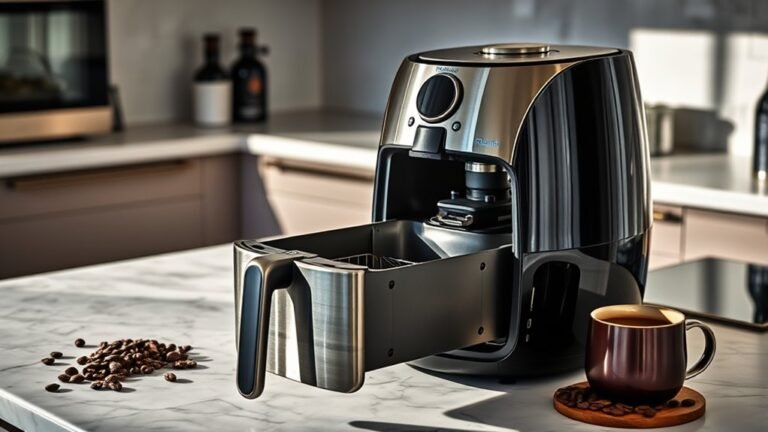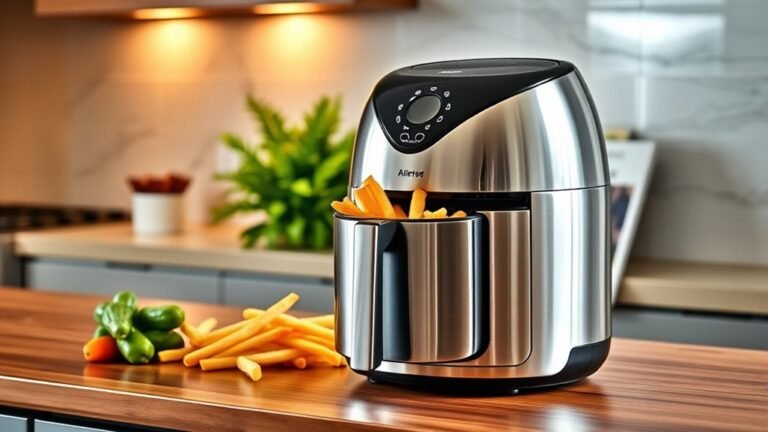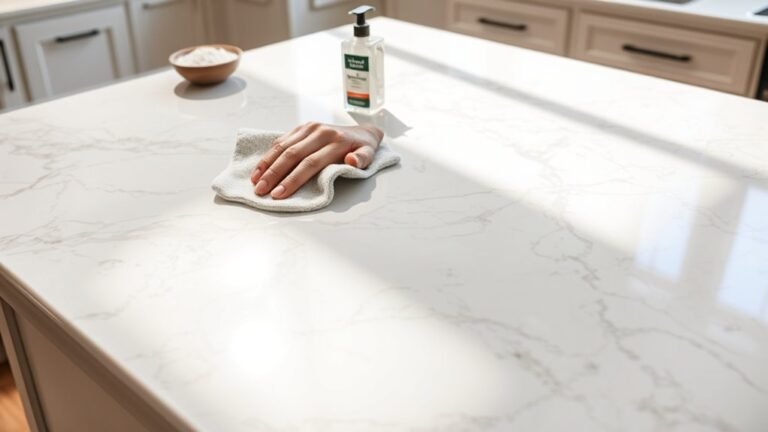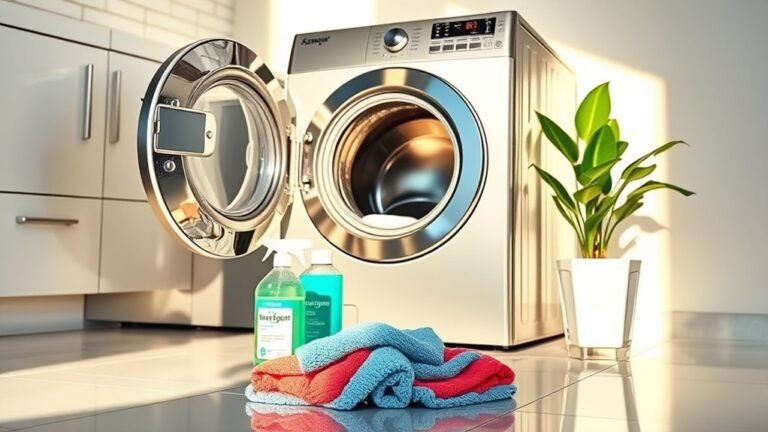How to Maintain a Clean and Odor-Free Garbage Disposal
To keep your garbage disposal clean and odor-free, run cold water before, during, and after use to flush out residue and solidify fats. Regularly clean it with mild soap and a long-handled brush, and freshen it naturally by grinding citrus peels or ice cubes. Avoid hard items and fibrous scraps to prevent jams. Use baking soda and vinegar for tough smells, and always follow safe practices. If you want to get the most from your disposal, there’s more helpful advice ahead.
Regular Cleaning Techniques for Garbage Disposals

Although it might seem like a hassle, regularly cleaning your garbage disposal is essential to keep it running smoothly and prevent odors. To maintain freedom from clogs and smells, you should set a cleaning frequency that fits your lifestyle—once a week or biweekly usually works well. Using effective tools, like a long-handled brush or a disposal cleaning brush, lets you reach areas where food debris hides. Avoid harsh chemicals; instead, opt for mild dish soap and hot water to break down buildup safely. Running cold water during and after cleaning helps flush out residue, ensuring your disposal stays clear. Sticking to these simple, regular cleaning techniques lets you enjoy a fresh, trouble-free kitchen without the chains of maintenance worries.
Natural Deodorizers to Eliminate Odors
When your garbage disposal starts to smell, natural deodorizers can quickly restore clarity without harsh chemicals. You don’t have to settle for artificial scents or strong cleaners. Try these simple, effective methods:
- Toss citrus peels—like lemon or orange—into the disposal and run cold water. The oils freshen and cut odors.
- Sprinkle baking soda directly into the disposal, then pour vinegar. Let it fizz for a few minutes before rinsing with hot water.
- Freeze vinegar in ice cube trays and grind these cubes. It scrubs and deodorizes simultaneously.
- Use a mixture of water and essential oils, such as peppermint or eucalyptus, poured in and run for a revitalizing scent.
These natural tricks give you control over your kitchen’s clarity, letting you enjoy freedom from unpleasant smells.
Preventing Clogs and Build-Up

Keeping your garbage disposal smelling fresh is a great start, but preventing clogs and build-up will keep it running smoothly for the long haul. You want to avoid letting tough food scraps clog your drain, so always run cold water during and after use to flush everything through. Regular drain maintenance, like grinding small citrus peels or ice cubes, helps clear residue and sharpens blades. Here’s a quick guide to keep your disposal free-flowing:
| Action | Benefit |
|---|---|
| Run cold water | Prevents clogs and solidifies grease |
| Avoid fibrous scraps | Stops tangles and jams |
| Use citrus peels | Freshens and clears build-up |
| Grind ice cubes | Cleans blades and removes debris |
| Regular use | Keeps parts moving freely |
Stick to these tips and enjoy a hassle-free disposal!
Safe Practices When Using Your Garbage Disposal
Since garbage disposals involve sharp blades and water, using them safely is essential to prevent injuries and damage. To enjoy the freedom of a clean sink without worries, follow these best practices for disposal safety:
Using garbage disposals safely prevents injuries and keeps your sink clean and worry-free.
- Always run cold water before, during, and after use to solidify fats and flush debris.
- Never stick your hand or fingers inside the disposal, even if it’s off.
- Avoid disposing of hard items like bones, shells, or fibrous foods that can jam or damage blades.
- Use the disposal only for biodegradable food scraps, not chemicals or grease, to keep it running smoothly.
Troubleshooting Common Garbage Disposal Issues
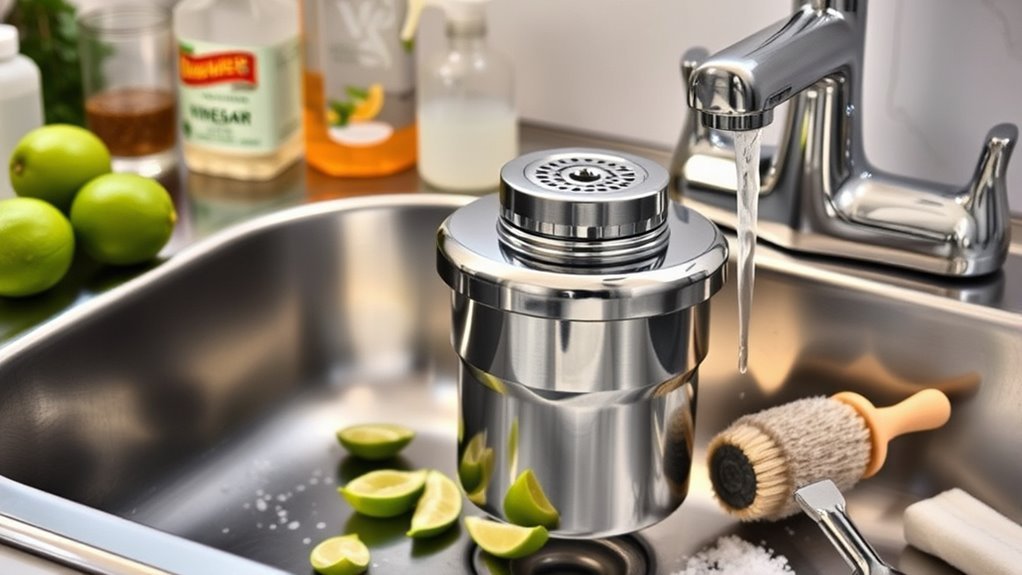
A garbage disposal can occasionally act up, but you don’t have to call a professional right away. If you face a disposal malfunction, start by checking for jams. Turn off the power, then use a hex wrench to manually rotate the blades through the bottom hole—this often frees stuck debris. Noise issues typically signal something caught inside or loose parts. Inspect the unit for foreign objects while power is off. Reset the disposal by pressing the red reset button usually found on the bottom. Avoid forcing the switch if it won’t turn on; instead, verify the circuit breaker hasn’t tripped. By tackling these common issues yourself, you maintain freedom from costly repairs and keep your disposal running smoothly and odor-free.
Frequently Asked Questions
Can I Put Bones in My Garbage Disposal?
You shouldn’t put bones in your garbage disposal because they can seriously damage the blades and motor. Bones disposal is tricky since they’re hard and tough to break down, leading to clogs or jams. For smooth disposal maintenance, stick to soft food scraps and avoid anything too hard. That way, you’ll keep your garbage disposal running freely without annoying smells or costly repairs. Keep it simple and enjoy the freedom of hassle-free kitchen cleanup!
How Often Should I Replace My Garbage Disposal?
Did you know the average garbage disposal lasts about 10 years? When considering the frequency of replacement, keep an eye out for signs of failure like strange noises, leaks, or poor grinding. If you want to avoid unexpected breakdowns, replace it before it completely fails, so you maintain your kitchen’s freedom from hassle. Regular checks let you enjoy smooth operation without being tied down by sudden repairs.
Is It Safe to Use Chemical Cleaners in Garbage Disposals?
You might wonder about chemical cleaner safety for your garbage disposal. It’s generally best to avoid harsh chemical cleaners since they can damage the unit and harm your pipes over time. Instead, you can enjoy natural alternatives like baking soda and vinegar—they’re safe, effective, and free you from worrying about toxic residues. You’ll keep your disposal fresh and functional without compromising your freedom to use eco-friendly, simple solutions.
What Types of Food Should Never Go in a Garbage Disposal?
Back in the days of knights and castles, you’d never toss armor scraps into a moat, right? Similarly, you shouldn’t put non-food items like plastic or metal in your garbage disposal. Avoid fibrous foods like celery or onion skins, which can tangle, and starchy items like potato peels that cause clogs. Instead, embrace your freedom by using compost alternatives for scraps—nature’s way of recycling—keeping your disposal and home fresh and unburdened.
Can a Garbage Disposal Cause Plumbing Leaks?
Yes, a garbage disposal can cause plumbing leaks if it’s not properly maintained. If you skip regular garbage disposal maintenance, seals and connections might wear out or get clogged, leading to leaks. To keep your freedom from unexpected water damage, perform routine plumbing inspections and cleanings. Catching issues early lets you fix problems before they escalate, so your kitchen stays leak-free and hassle-free.

